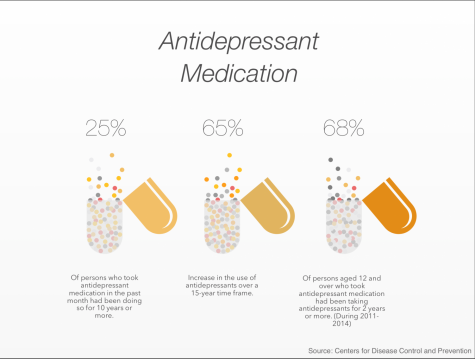More and more teens are suffering from depression, but is medication really the answer?
Jahlea Douglas argues that everyone should consult a mental health professional before deciding to go on antidepressant medication
Junior Jahlea Douglas is co Editor-in-chief and has been a part of staff for three years.
February 5, 2019
According to Blue Cross Blue Shield major depression for teenagers has risen 63% since 2013.
Some teenagers may legitimately be suffering from depression, but the scary thing is that some may not and doctors seem so quick to prescribe teenagers antidepressants.
According to the Centers for Disease Control and Prevention, less than one-third of Americans taking one antidepressant medication and less than one-half of those taking multiple antidepressants have seen a mental health professional in the past year.
How is it that teens can be prescribed a medication that “takes the pain away” without being required to meet with an actual mental health professional? Sometimes teens just need someone to talk to. Pills are not always the answer.
According to the American Psychological Association, many Americans visit their primary-care physicians and walk away with a prescription for an antidepressant or other drugs without being aware of other evidence-based treatments — such as cognitive behavioral therapy — that might work better for them without the risk of side effects.
Therapy is an option that is bypassed way too many times when it could be the answer to the problem for many people. But why? Why don’t people try therapy first? Shouldn’t it be the most logical response to a set-back in one’s mental state?
Then if therapy does not work, it might be appropriate for one to be prescribed antidepressants in conjunction with attending therapy sessions.
So once teens are prescribed these pills, then what? Are there side effects? Yes, indeed there are an abundance of side effects, one of them being suicide.
According to Women’s health physiatrist Kelly Brogan, antidepressants were detected in 41% of the women who committed suicide, showing that they were under the influence of antidepressants at the time of death.
Just as one thought that they were in the clear for this type of horrific tragedy, it is just one of the possible side effects that people are willing to take a chance with.
So knowing this, one is probably freaking out and considering coming off of these drugs once feeling better, but do not be quick to do so because there are also side effects of doing that too.
Common side effects of coming off of an antidepressant instantly without consulting one’s doctor for a tapering schedule may include: anxiety, fatigue, nightmares, trouble sleeping, depression and mood swings, nausea, vomiting, diarrhea, abdominal cramping, flu-like symptoms, headache, and sweating.
Once feeling better the recommended amount of time for still taking one’s medication is six month to a year, but consulting a doctor is the best option before coming off of any type of pill.
Deciding whether to take antidepressant pills is a tricky situation, knowing what the long-term side effects are before getting on them is one step. But the first step is to consult you doctor about referring you to a mental health therapist because sometimes you just need someone who can help you through your problems.
The views in this article do not necessarily reflect the views of the GENESIS staff. Email Jahlea Douglas at [email protected] .









